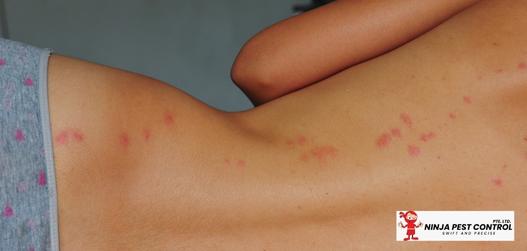Bedbugs and Diseases
The Answer Is No
The popular medical view on bed bugs and disease is that they do carry germs, but it is not confirmed they can spread disease.
While some sources claim that bed bugs caused leprosy, Q-fever, oriental sores, and brucellosis infections to spread, these occurrences are poorly documented.
Secondary Infection Is Possible
Secondary infection may occur if the bites are not cleansed and disinfected, resulting in swelling and bleeding.
Bites of bed bugs are more likely to occur in children, those with weakened immune systems, and the elderly, especially those who are immobilised and unable to walk. Furthermore, some individuals bitten by bed bugs have had allergic responses that necessitate medical intervention, particularly when confronted with a large number of bites.
It Can Cause Itching
Bed bug bites can cause irritation, as well as edema or blistered skin. It’s also crucial to remember that there are other bites that can cause and induce similar skin rashes.
So, if you’re unsure whether the bites are from bed bugs, be sure to check for other telltale signs, such as fecal matter or eggshells.
What Is The Greatest Risks Posed By Bedbugs?
The greatest danger from bed bugs is the discomfort of their bites or the psychological stresses that result in sleeplessness and worry.
Bites from bed bugs are generally not visible for more than a day after the insect has fed, if at all.
In extreme reactions, large wheals can appear. These wheals gradually reduce in size, becoming small, red marks.
Treatment For Bedbugs Bites
Consulting a dermatologist for treatment might be helpful.
The following treatments and medications may be prescribed by your dermatologist to treat bed bug bites:
- Itch: If you have recently been bitten by a bee, your doctor may prescribe an antihistamine pill or liquid to help. A corticosteroid cream can also be applied to the stings. Your dermatologist will determine which treatment is ideal for you
- Allergic reaction: For a severe allergic reaction, some individuals may require an injection of an antihistamine, corticosteroid, or epinephrine (adrenaline) in the form of an Epipen.
- Infection: An infection might require an antibiotic. If the condition is minor, your dermatologist may suggest an antiseptic ointment that you can purchase over-the-counter. Your doctor will recommend the best one for you. An antiseptic or preventative agent to avoid a skin infection may also be suggested by your dermatologist.
Treatment For Bedbugs Bites – DIY Method
You can most often treat insect bites at home if you do not have any symptoms of an infection or a severe reaction.
Simply start by:
- Washing your infected skin with soap and water: this will help to reduce the itchiness and help to disinfect any germs.
- Apply a corticosteroid cream to infected skin: At your local drugstore, you can obtain a mild form of this medicine without a prescription. Stronger corticosteroids must be obtained through a doctor.
Bites from bed bugs usually heal and go away on their own, so there is no need to be concerned. However, if you do develop an infection, it is important to see a doctor right away.
If you are still unsure if your bed bugs infestation has been cleared, it is important that you consult your pest control Singapore specialist, and check if they specialise in offering bed bugs control as one of their pest control services.
500+
Homes Inspected
300+
Successful Projects Executed
4-5 Stars
Positive Ratings


